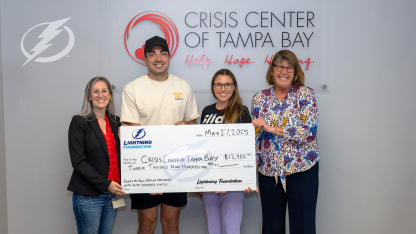Double it.
That is Tampa Bay Lightning forward Nick Paul’s goal for the Points by Paul initiative next season.
Points by Paul is an agreement that sees the 30-year-old forward donate $150 to the Crisis Center of Tampa Bay for every point he scores each season. With 41 regular season points during 2024-25 and two more in the 2025 postseason, Paul contributed $6,450 alone to improve mental health services in the area.
Paul’s donation was matched by Slide Insurance, meaning Points by Paul raised $12,900 total this season. Paul presented a check in that amount to the Crisis Center of Tampa Bay on Tuesday.
He hopes to raise that total again next season.
"I meant double as in getting more people behind it and having more awareness around it and try to double the check from the previous year. I just want to keep having an impact on the community,” Paul said.
“I love Tampa Bay. I love the people that are here and I love the community that we have. For me to be able to come back and do something and try to make an impact is what I want to do.”
Mental health, particularly for area youth, is a priority for Paul. He lost a friend to suicide while in high school and was in search of a way to honor them while also bringing more attention to mental health initiatives.
Points by Paul began while he was playing in the Ontario Hockey League (OHL) for the North Bay Battalion. After losing his friend, he worked with a local hospital on how he could help.
The hospital brainstormed the points donation, and Paul has carried it into his NHL career. When he signed his contract with Tampa Bay, he knew it was time to reignite Points by Paul.
Crisis Center of Tampa Bay is a 24/7 public call center. They can be reached by dialing 211 and provide advice, resources, counseling and connections for those facing emergencies that include suicidal thoughts, substance abuse, sexual assault, domestic violence, behavioral concerns, medicinal transportation issues and more.
Clara Reynolds, Crisis Center president and CEO, accepted Paul’s donation on Tuesday afternoon. She said Paul providing a donation while being a voice of hope makes a difference.
“Not a lot of people like to talk about their journey of sexual assault or suicide or the myriad of reasons people come to us,” Reynolds said. “By doing Points for Paul, he really is saying that it’s okay to not be okay. He is living that value of, it’s okay to reach out and ask for help.”
The Crisis Center impacts about 180,000 people each year and answers around 111,000 calls annually from veterans in crisis, first responders in crisis, a sexual assault hotline, a statewide substance abuse hotline and more.
Paul called the organization “inspiring”, adding they make the community a better place. While he doesn’t focus on his stats, Paul takes pride in knowing his offense carries more weight than just the score on any given night.
"You go on the tours and you see how many people are answering calls. And then you start to think, ‘Alright, who's calling? What are they going through to the point where they have to make a call, and what if there wasn't someone answering that phone?’ I mean, that's the biggest thing,” Paul said. “You see everything that everyone does here, how much they care, the training that goes on, just the passion that everyone has here to make their community a better place.”
Paul is working this offseason to find other ways to contribute beyond just when he scores. However he can help, Paul is all in.
"It's just nice knowing when you score, it's like, 'I'm helping out.' I don't want to just score for me, I want to try and score and get some more money to donate,” Paul said.
“Talking with the team that I have working behind me, that supports me, we want to add more to raise more money so it's not just dependent on whether I put the puck in the net or not. I just want to make sure we can do events like dinners or summer ball hockey games or little events that we can start doing to raise more money and help out places like the Crisis Center that do so much.”
Points by Paul funds are used to support suicide prevention efforts, including the gateway contact center that provides 24/7 access. After the COVID pandemic left many feeling alone, more people are reaching out than ever before, according to Reynolds.
The conversation surrounding mental health is more central than ever. Reducing the stereotypes on those conversations should continue, Reynolds said.
Points by Paul is one way to keep that momentum going.
"Look at somebody who just came in and automatically embraced an area that many athletes unfortunately have not necessarily embraced. But one of the things that Nick said, even today, was that now that he tells his story, he's getting more and more athletes that are also talking about their story,” Reynolds said.
“So he is not only reducing stigma and stereotypes in the community, but also around the athletic community. So I am really hopeful that sometime in the future we will have other athletes that are willing to come to the Crisis Center of Tampa Bay, learn about what we do and actually talk about how these services can help those folks.”



















